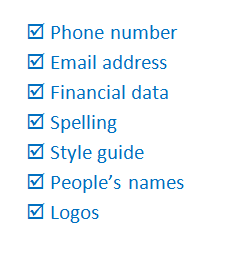I hope you find my writing and business tips and observations useful. My business and blog are dedicated to helping businesses communicate clearly and reach their potential.
Read, subscribe to my newsletter, enjoy!Tash
Giving a wealth of choice…
I often pick up surveys for errors they make – it is unfortunately a common occurrence.
Today I spotted one that used perfect grammar and made perfect sense. The question listed the following options for someone’s gender:
- male
- female
- intersex
- other (please specify)
- prefer not to say
For a question where I am used to see two possible answers (male and female), such a long list surprised me!
How much is too much?

When talking to clients, I talk about writing from their points or from scratch – I don’t list writing blog posts, webcopy, disclosure documents, annual reports and letters. Fewer options make their decision easier.
How many choices make it hard to choose?
For a question with a clear answer (like how old are you or do you live in Australia), a lot of choices can work as you can skim across the options to find the relevant response.
But at other times, a large choice can hamper people actually making a decision.
I think there is a balance between not restricting people, offering them options, and overwhelming them with choice. Especially if some of the options are going to be chosen by a very limited number of people.
In business, too many choices can result in people being indecisive and not buying.
I know it can be hard to not offer something (what if my next potential client wants exactly the thing I don’t mention?) but considering if less is more can simplify and help your customers.
[Tweet “Consider if less is more before giving customers lots of choices”]
You can always add a note somewhere to the effect of ‘if what you want isn’t listed, give us a call’.
So how many options does your business offer?
Have you considered if it is too many, or how it could be simplified?
Are you communicating well within your business?
Maybe you are, but a recent survey from the Australian Institute of Management (AIM) has shown that only 39% of respondents classed two-way communication between management levels as ‘effective’ or ‘very effective’.
Of course, that means 61% consider it moderately effective or worse. That’s a big number.
Note for micro-businesses (with 20 or fewer staff) 59% rated it effective or very effective while 50% gave that rating if staff levels between 21 and 50 applied. Staff rate this effectiveness less as the business size grows, which makes a certain amount of sense.

Communicating effectively is the only way to get your idas across to others – and to get them to help you implement your ideas.
Communications is important
On a positive note, the survey showed many people will stay in their current job because they have a great relationship with co-workers.
So the question is, how do businesses improve communications within teams and from the leadership to everyone else?
I think the key is wanting to communicate – the hows and skills can only do so much if management wants to keep secrets and power to themselves.
Improve communications ideas
From the survey itself, some ways to improve that perception of two-way communications include:
- 57 % believe management listens and responds to employee concerns – so actively listening is a clear method for making improvements
- 59% stated that being valued and understood is a major factor in employee engagement – that comes back to listening and ensuring communication really is two-way
- 55% agree and 43% strongly agree that is it important to be acknowledged for their work – communicating appreciation of people’s efforts and skills could make a huge difference in their happiness and loyalty. Yet only 54% felt appreciated by their employer…
Poor surveys are time wasters…
I’m busy, you’re busy and I suspect even people (including Government employees) writing surveys are busy.
So why do people put up silly surveys and waste everyone’s time?
Late last week I was asked to fill in a survey Government-run gathering information to help small businesses – a worthy cause so I completed the survey.
But some of the questions were a waste of time – not only were they hard to answer, I doubt they will give meaningful results so it has wasted everyone’s time.
Poor survey question samples
Here are some of the worst questions I answered, with my comments to explain why I didn’t like these particular questions.
Q1 – is your website interactive? Can you edit it yourself (eg online forms, content)?
A1 – yes or no
What is the correct answer if my site is interactive but I can’t edit it, or if I can edit it but it isn’t interactive?
Q2 do you use a still or video camera for work purposes?
A2 – Yes – what do you use it for?
Um, for taking photos or videos? I wonder how many people gave that answer! I decided to be nice to them and answered ‘take photos for use in my blog’
Q3. who is your local IT service company in a, b and c?
Personally I had no idea! And what did they mean by local anyway – same suburb, same city, same state?
The question perhaps makes more sense if you assume they want to know who I used for those services or maybe they were trying to ask ‘do you use a local IT service company for a, b or c’.
Q4. how do you get business advice and information?
A4 – rate each option in the following list {which includes trade magazines, state gov department website, dept of broadband, communication & digital economy}
The list did not include professional advice (accountant, coach, etc), online articles/blogs or government business info sites which were the first three things I thought of! Yet it included such specific things as a government department site and the dept of broadband, etc which I have never heard of!
When giving answers, it is important to review the list to ensure it covers enough breadth – or change the question to indicate it is a narrow aspect being researched.
Q5. do you or any of your staff telework? (work from home connecting to the business network and database)
How do I answer that – I work from a home office so I am nearly always connecting to the business from home but I don’t think it is really telework when the network is also at home!
Do they want me to include sub-contractors/suppliers as staff or keep ‘staff’ to mean employees?
Maybe this post will compensate for the wasted time as at least we can all learn what not to do in our next survey or feedback form!
My strong recommendation is to always get an outside person to read a survey when you think it is finished because they will spot errors in logic, assumptions and inconsistencies better than you can.
What are your survey stories? Have you found they are harder to write than they appear? Or maybe you’ve come across some time-wasting questions like these ones. I’d love to hear them – although it would be nice to think most surveys are well done!
You’d think the big guys would get it right…
Is it just me, or do you have more tolerance of a small business making mistakes than a big business?
That is, for mistakes like spelling errors, dead links on their website, out of date information and lack of clarity in a message.
I think if you have the budget for huge campaigns, you have the budget to get a writer or editor to help you avoid stupid mistakes. A sole trader on the other hand often has less money to spend and more hats to wear so mistakes are a little more excusable.
Budget for the details
I was asked by a major entity to complete a survey that they intend to use to produce some data that can impact on the digital media and brands.
It was longer than I expected but more than that, it was very disappointing from a group that is producing such a report.
Having a poor survey through lack of attention to detail reduces their credibility – if they can’t get the questions right, is their analysis going to be any good?
Compared to the time and money they have put into preparing and promoting this survey, and then turning the results into a report, it would have cost little to have had it reviewed by a writer or editor to ensure it would work. It’s like spending a million dollars to build your dream house but not checking the architect remembered to add a front door.
International survey
Some of the issues I came across in this particular survey were:
- I was invited twice (ie via two different .com.au email addresses) to complete this survey. Yet there was a question ‘Please enter your five digit zip code’ – my four digit postcode wasn’t accepted. So are they so ignorant to not realise we don’t all have a US zip code (the error messages actually stated “You must enter a valid US zip code”) or was this survey only meant for US residents?
Tip: if preparing any sort of online form, make it usable for all aspects of your audience – and make it clear at the start if some groups can’t participate - There were too many assumptions within the questions, but I had to answer them anyway so they are getting meaningless results from the survey. For example, “which of the following do you generate money from?” listed about six possible answers – I don’t earn money from any of them but there wasn’t a ‘none of the above’ type answer.
I did get some satisfaction in a couple of those questions if they at least gave an ‘other’ option as I wrote the real answer in that field!
Tip: always have an answer for everyone in a survey – if people can’t answer, they can skew your results with dummy answers and it frustrates them - One question asked ‘what is your key source for finding companies that don’t meet your requirements?’ followed by a series of criteria that you could use to filter out a company and a couple of other points. In other words, it made absolutely no sense and I couldn’t answer it – well I used the ‘other’ field to say it made no sense so I couldn’t choose from their list!
Tip: always do a final read of materials to ensure everything makes sense. Edits along the way can change things so read it in full to be sure – and preferably get fresh eyes to view it, too.

Poor data can’t result in a good report, whichever way you add it
One better written question they included asked where I got inspiration for my blog posts. I could only select one answer, which is limiting as I find inspiration in many places. However, I again used the ‘other’ option and wrote I am inspired by poor communications efforts I see – such as surveys like this with poor questions! You have to find fun where you can, I say!
So not a great survey (and I will struggle to trust their results) but it did inspire a blog post and gave me some amusement using their ‘other’ fields!
Improving your surveys and questionnaires
Why do you run surveys or feedback questionnaires?
Sometimes, when I read questions in surveys and other forms, I do wonder how important the final data is for the person behind the questions – do they run them for fun rather than as a valid business tool?
Here are two questions I was recently asked to answer – and some tips on how to avoid the same mistakes…
Give everyone a possible answer
“When will you purchase a new car?
within a month
1 – 2 months
2 – … months
… – 24 months
never – I don’t purchase new cars”
As we purchased a new car a week ago, I couldn’t give an honest answer to that question – we won’t be buying another within 24 months but ‘never’ is wrong, too.
TIP: make sure you provide an answer for all possibilities, even if one is ‘unsure’ or ‘don’t know’. If your format allows, ‘other’ not only gives options but can gain more insight for you.
Write questions to get the data you need
“Can you tell us if you are pregnant? Yes No”
Yes I can tell you but the yes answer may mislead you as I’m not pregnant and I assume that’s what you really want to ask me about… I could get really pedantic here and note that I CAN answer but choose not to ( writing ‘please tell us’ or ‘Will you tell us’ are grammatically better than ‘can you tell us’).
TIP: Make sure the question is asking for the information you actually want. In this case, the much simpler ‘are you pregnant?’ would have done the trick.
Getting meaningful and useful results
If you don’t plan your questions carefully, the results you get can be completely meaningless. For example, if 5% of respondents bought a car recently and answered ‘within a week’ you may mistakenly think the next week is prime time to sell a car. There is no way you can tell that someone gave a false answer to compensate for questions they don’t understand/misunderstand/can’t answer.
Depending on how you intend using the answers, skewing results like this can have serious implications. For example, if you plan a marketing campaign and spends thousands of dollars in April when the real results showed September to be effective, you’ve wasted money (in the survey and the marketing). What if you base a new product or pricing structure on the answers collected?
Checking, editing, proof reading and rechecking your questions may seem tedious. The details in faulty questions that I occassionally point out may seem trivial.
The bottom line, however, is that good survey and feedback questions are more fun to answer, give accurate and useful results, and build your credibility (through attention to detail and simplicity for respondents).
I suggest you always get someone else to read your questions before you finalise any form or survey. And, yes, this is a service Word Constructions provides…
Match questions and answers…
Recently I wanted to make a complaint to a company and was directed to their online form (hmm, is it telling that their products come with a prominant page about how to complain??) and saw this as the opening sentence:
“already been attended to by phone or other means would you please advise YES/NO”
How does it help them to know I will (or won’t) advise them on whether my issue has already been dealt with? Wouldn’t the better question be ” Have you already told us about this issue? YES/NO”
Whenever you give people a choice of answers in a survey or form, you have to give answers that actually give the information you are after. Remember that the words ‘would you’ are what people will try to answer, so put them at the start of your question or don’t use them at all.
Generally, use active verbs and phrase questions as simply as possible to avoid confusion and misunderstandings.
PS I could go on to say how important it is to get your promotional materials right – and not use old materials after you make changes. My original complaint was about their promotional brochure offering 4 things in a set but their website offering two things for the same price. Putting these two issues together has totally destroyed that company’s credibility and I don’t trust a thing they say now – and won’t be returning there.
What other small businesses are doing online
About two thirds of small businesses using online marketing in some way say that new customers find them through search engines. Would you agree that is a key way that customers find you? If so, what are you doing about your search engine results?
The American Express OPEN small business search marketing survey (March 2011) has a number of statsistics to show where small businesses see online marketing impacting their sales.
While it is a list of survey results (yawn, yawn!) it is a summary so easy to read and can give some useful insights for trends within small business which is useful for comparisons and particularly useful if you sell to that sector. My opening questions are also examples of how you can use this information to assess your own online marketing.
Read the report and let me know what you learn from it…
Surprise mention in survey
I did a survey today which was ok on the whole but question 5 had a surprise element in it. Note I did not know who was behind the survey (deliberately to get unbiased answers).
The question was in effect “Are you primarily a business or personal customer of these services?”
The answer options were “personal/business/equal/I am no longer a customer of Company X”
So the anonymous-to-get-unbiased-answers aspect was thrown out the window with that answer which is not so good. It also didn’t mean a lot as I never said I had been a Company X customer, nor even acknowledged I’d heard of company X before. The fourth answer didn’t even answer the question so was completely irrelevant.
The lesson is to read every answer with the question before you finalise a survey or any other multiple choice list – this also applies for a bulleted list in that each point must complete a sentence from the introduction.
From the above example…
“Are you primarily a business or personal customer of these services?” “personal” works
“Are you primarily a business or personal customer of these services?” “no longer a customer of Company X” doesn’t work.
If you are writing or editing a survey, ensure you read each answer with the question in this way to get a polished, sensible result.
Give options that make sense
I have written before about the need to use clear questions in surveys to get meaningful results, and given some tips on how to write such questions. Every time I do a survey with poor questions I cringe – do they really not care about getting good results or just don’t understand that not everyone knows what they are really asking?
One of the most common questions I have seen in online surveys is the following:
Are you …
male
female?
Technically, the answer is yes – I am male or female and so is every other human I know of! Fairly pointless question to ask unless you have a third group responding.
In this case, we can see what is really being asked (“which are you?”) and the available answers lead us to answering correctly, but it isn’t always so easy.
It was great recently to be asked to help a major research centre refine their questionnaire. They had determined the questions they wanted to ask but understood that how they asked was critical to the final result of their research.
So if you are preparing surveys or questionnaires, my two key tips are:
- read the questions to make sure the options answer the question and suit your needs
- get at least one other person to read the questions to ensure they make sense to a less involved pair of eyes
Use your words wisely!





Recent Comments